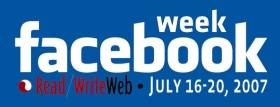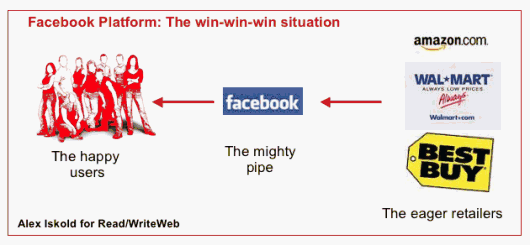This week is Facebook Week on Read/WriteWeb. Over the next 5 days we’re going to focus on the most impressive Web Company of 2007 – analyzing it and reporting on its top third party apps. To ‘launch’ Facebook Week, let’s review how this company turned itself into the leading web app platform on the Internet, in a matter of months.

To celebrate Facebook Week, we’ve set up a Facebook Group for Read/WriteWeb readers. It’s open to anyone… even Australians 🙂 We’re running a poll too, at the end of this post, asking how many ‘friends’ you have on Facebook currently. We’ll run other Facebook-related polls over the course of the week.
How Facebook Took On MySpace
Facebook has come into its own over the past year, by first expanding its user base in September 2006 (beyond US college students) and then opening up its platform in May 2007. Neither of these were surprising moves, but both were necessary in order for Facebook to challenge its rival MySpace.

The Fox Interactive-owned MySpace has been the number 1 social network for the past couple of years, but it had (still has) two glaring weaknesses. One is that MySpace is a closed platform, meaning that third party developers either cannot integrate their products into MySpace or – even if they can – there are many restrictions. The second major ‘weakness’ of MySpace is that it is heavily skewed to a teen audience; and so is not particularly appealing to older people. There are other issues too – e.g. the design of MySpace is appalling – but the two main weaknesses above are the ones that Facebook needed to target, and did so very successfully.
Facebook’s attack on Myspace started in September 2006, when they opened up their user base beyond US college students. That allowed people like me – a mid-30’s kiwi – to join. But still, at that point there was little in Facebook to appeal to me, or other non-college users. However that changed in May 2007, when Facebook launched an open platform. Soon after, there were hundreds of third party apps in Facebook – and suddenly I had loads of ‘friends’ on the platform.
The Platform
In Read/WriteWeb’s 2007 Web
Predictions, published in December 2006, we predicted that “social networks will
probably […] become more open – and data portability will start to occur.” Facebook essentially made that a reality in May 2007, with the launch of “The Platform” – a system
enabling 3rd party companies to integrate their services inside of Facebook user pages.
Almost overnight, this made Facebook much more of a threat not only to MySpace –
but interestingly to Yahoo
too. Suddenly, Facebook was a major player on the Web scene. Why? Because no other Internet bigco had opened its platform to such an extent – possibly with the exception of Amazon. But Amazon’s open platform is more about portability of data, whereas Facebook’s is an open invitation for third party apps to integrate into a hugely popular social network platform. In the long run, Facebook’s May 2007 platform launch may have signaled the next
Big IPO (after Google’s).

The Future
Facebook has its competitors – e.g. the start
pages and other social networks like
LinkedIn. But there’s no question Facebook has set its sights on being a big,
influential Internet company. Already many startups have integrated their products into
the Facebook platform, so over the rest of 2007 it’ll be interesting to see how the
platform continues to grow and how many more mainstream users Facebook attracts.
Coming up this week: we’ll profile many of the Facebook apps coming out and analyze further the Facebook platform. Stay tuned!










